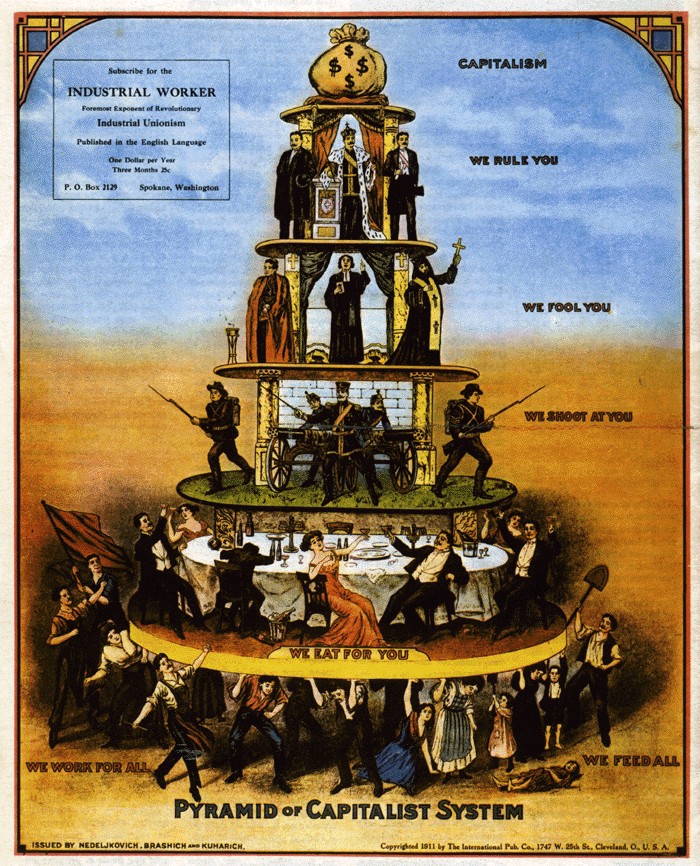I have seen this image floating around the Internet for years, and it is finally time for me to put it to rest. Contrary to its message, capitalism does not lead to exploitation and does bring everybody out of poverty into prosperity.
Let’s look at this image first. It shows the supposed (coercive) hierarchy of capitalism.
- The first level is the poor and exploited laborers who are nearly dying for the upper classes. They are poor as dirt and never will be richer.
- The next level looks like the bourgeoisie, i.e., the businessmen. They are thoroughly enjoying the laborers’ food, or rather the product of the laborers’ work.
- The third level shows the military; the people who coerce and keep the laborers as laborers.
- The fourth level is interesting because it is a bunch of religious leaders, implying religion is key to capitalism.
- The fifth level is just as interesting as the fourth level of the hierarchy. Those on this level are state politicians and rulers.
- The sixth and last level has a money bag on top labeled “capitalism.”

I will start from the top level and go down to analyze each level.
Capitalism, as depicted by the money bag, is on top of the hierarchy, and clearly the money bag represents greed. The problem here is that greed is part of human nature; the economic framework of a society does not change this truth. The difference lies in what people are using as a means for power. In capitalism it is money, and in socialism it is political force.
A state is the antithesis of capitalism, i.e., an economic system with institutions respecting private property rights. The state must necessarily confiscate private property to operate. The state might at times protect private property rights, but this does not mean that it is a part of capitalism. If one does say that it supports a private property ethic, then one runs into a contradiction. The person claiming this would be saying that the institution that must first violate private property rights protects private property rights. So, any statesman is not respecting private property in his capacity as a politician and as such cannot be considered as a person who upholds capitalism.
Religious leaders are not a necessary part in a free society. It is imaginable an atheist society that based on the private property ethic. Furthermore, anytime the religious leaders use the state they are not supporting the private property ethic.
The state military also falls into the same class as politicians, they do not support capitalism.
Businessmen, investors, entrepreneurs, etc. in capitalism do not exploit workers. Two parties in an employment arrangement, an employer and employee, voluntarily agree to the wages and benefits the worker will receive in compensation for work. This can hardly be exploitative in nature since it is voluntary.
Workers become richer in capitalism. Capitalism allows for action free from aggressive coercion, which allows for optimal capital investment, use, maintenance, etc. The more machines can produce and the more efficiently they can produce the higher the wages of the workers. It is the state which hinders capital accumulation by brute force and sets up incentives to discourage capital accumulation, thus slowing the growth of workers’ wages.
There might be some who still object because they believe in the labor theory of value and Marx’s class warfare, but it is not the subject of this post to dispel such myths as the labor theory of value. Another post will cover those topics.


Be First to Comment